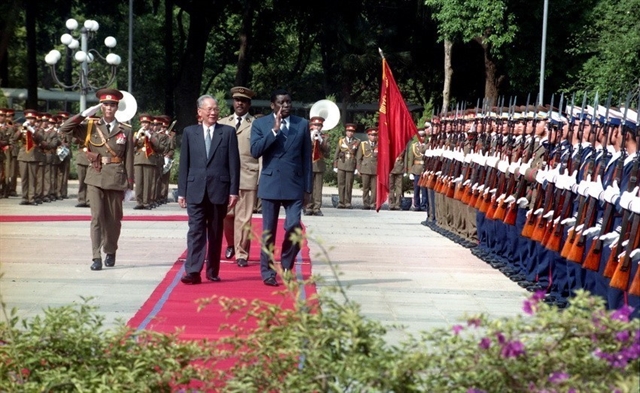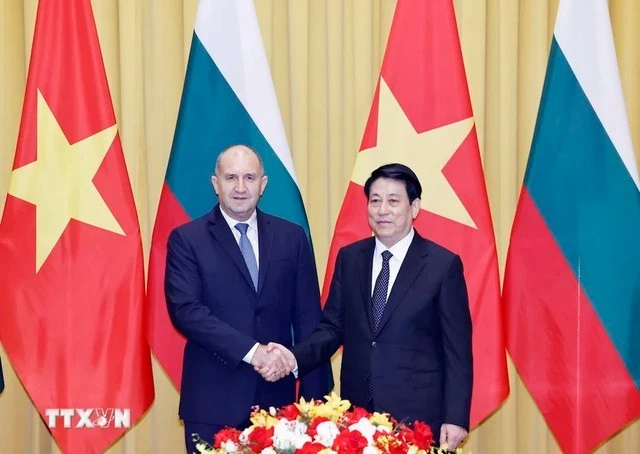 Politics & Law
Politics & Law

 |
| Vietnamese President Lương Cường (R) and Bulgarian President Rumen Radev at their meeting in Hà Nội on November 25, 2024. VNA/VNS Photo |
HÀ NỘI – Since Việt Nam and Bulgaria established their diplomatic relations on February 8, 1950, the two countries have enjoyed growing traditional friendship and fruitful cooperation across various sectors.
Strong friendship foundation
Việt Nam and Bulgaria share a longstanding tradition of friendship. The official state visit to Bulgaria by President Hồ Chí Minh in August 1957 laid the groundwork and marked a significant moment in the history of bilateral relations.
During the most challenging and difficult years of Việt Nam's struggle for national independence and nation-building, the Government and people of Bulgaria offered invaluable material and moral support. Many infrastructure projects in the fields of economy, education, and healthcare were established in Việt Nam, thanks to Bulgaria’s material assistance, technical expertise, and the selfless labour of Bulgarian experts. Many Vietnamese citizens studied and worked in Bulgaria during the 1970s and 1980s, becoming leading scientists, engineers, and experts in Việt Nam who have made, and continue to make, substantial contributions to the defence of the country and national construction. This is a priceless asset and a key factor in strengthening the solidarity and friendship between Việt Nam and Bulgaria.
Building on this tradition, over the past more than seven decades, both countries have made continuous efforts to enhance and consolidate bilateral relations through regular exchanges of high-level delegations, the establishment of the Intergovernmental Committee and regular political consultations, the implementation of numerous agreements and cooperative programmes, and mutual support at international forums.
Their positive political relationship has been marked by many high-level visits from both sides. Party General Secretary and State President Tô Lâm had a meeting with Bulgarian President Rumen Radev during the 79th session of the United Nations General Assembly in September 2024. Speaker of the Bulgarian National Assembly Rossen Dimitrov Jeliazkov visited Việt Nam in January 2024, and Bulgarian President Rumen Radev paid an official visit to Việt Nam in November 2024.
In their high-level and other meetings, Bulgarian leaders always expressed their fondness and appreciation for the historical traditional ties and admiration for Vietnam’s achievements in socio-economic development and international integration. They have also expressed their willingness to serve as a bridge for expanding cooperation between Việt Nam and European Union (EU) countries, as well as the Balkans region.
During the November 2024 visit by Bulgarian President Rumen Radev to Việt Nam, both leaders reiterated their desire to enhance cooperation. A joint statement issued during the visit underscored their mutual commitment to expanding ties across multiple sectors, including trade, economy, science, and education, to contribute to regional and global stability and development.
The two countries also work closely together in regional and international forums, particularly in the context of the United Nations, ASEAN-EU cooperation, and the Asia-Europe Meeting (ASEM).
Bright trade-economic cooperation prospects
Bulgaria is among the EU member states that have led the ratification of the Framework Agreement on Comprehensive Partnership and Cooperation (PCA) between Việt Nam and the EU, as well as promoting the signing and ratification of the EU-Vietnam Free Trade Agreement (EVFTA) and the EU-Vietnam Investment Protection Agreement (EVIPA). In September 2023, the Bulgarian Parliament ratified the EU-Vietnam Investment Protection Agreement (EVIPA) with overwhelming support.
Việt Nam and Bulgaria’s trade relations have shown considerable growth in recent years. Bilateral trade reached US$118.7 million in 2020, $234.6 million in 2021, and $203.6 million in 2022, $211.5 million in 2023, and $263.01 million in 2024.
As of January 2025, Bulgaria has had 14 active investment projects in Việt Nam, with a total registered capital of $31.32 million. The largest investments include a coffee processing plant in Lâm Đồng Province and a knitwear and garment manufacturing project in Thừa Thiên Huế Province, each valued at $14 million.
The 24th meeting of the Inter-Governmental Cooperation Committee in May 2024 further explored possibilities for strengthening economic cooperation, with both sides focusing on digital and green technologies as major areas of future collaboration.
According to Vietnamese Ambassador to Bulgaria Đỗ Hoàng Long, digital transformation and green transformation have become top priorities for most countries, including Bulgaria.
In terms of development cooperation, Bulgaria has provided non-refundable aid (ODA) in the fields of education and women's empowerment to Việt Nam. In 2021, the European country contributed 35,000 EUR ($36,380) to Huế University and the University of Agriculture and Forestry to implement a project on diversifying local lotus products combined with eco-tourism development as a poverty reduction model for rural women.
Close education, culture, and people-to-people ties
Cooperation between Việt Nam and Bulgaria extends beyond politics and trade. Education and cultural exchanges have long been an important aspect of the relationship. Thousands of Vietnamese have studied and worked in Bulgaria, and many of them have become leading figures in Việt Nam’s scientific, technical, and educational sectors.
In recent years, the establishment of a Vietnamese Language Department at Sofia University has provided a platform for Bulgarian students to study the language, promoting greater cultural exchange. Both countries have signed several agreements to encourage cultural cooperation, including a Cultural Cooperation Programme for the 2024-2026 period.
Việt Nam also regularly participates in Bulgarian cultural events, such as the Rose Festival and the Slavic Writing Day in Hà Nội. Conversely, Bulgaria hosts cultural performances showcasing Việt Nam’s rich heritage, further strengthening the bond between the two peoples.
The Vietnamese community in Bulgaria, now numbering over 1,000, serves as a bridge for cultural and economic exchange, integrating well into Bulgarian society while contributing to the ongoing friendship.
Ambassador Long underlined that the close bond between the two peoples is truly the most valuable asset in their traditional friendship. VNS




